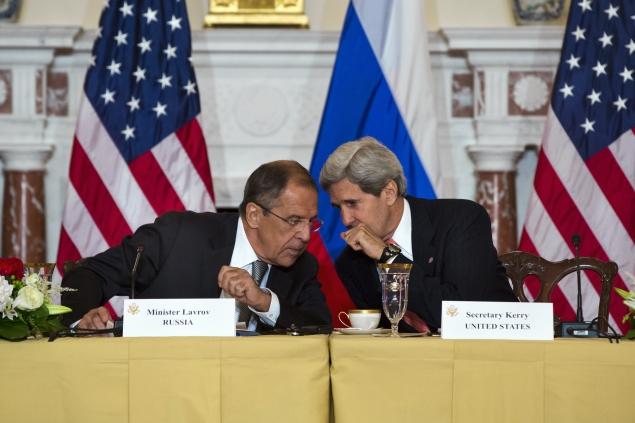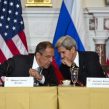
Problem-Rich Context for the Obama-Putin Non-Summit
Publication: Eurasia Daily Monitor Volume: 10 Issue: 149
By:

Russian Foreign Minister Sergei Lavrov and Defense Minister Sergei Shoigu’s visit to Washington last Friday could have repaired some damage from the predictably canceled presidential summit in Moscow, but the meeting failed to produce any substance for bilateral relations, which had deteriorated beyond the point of a “new reset.” Lavrov used his diplomatic skills and Shoigu relied on his sincerity and charm in order to play down the major setback and disprove the lingering “back to the Cold War” impression (https://ria.ru/politics/20130810/955475546.html). Russia is indeed not capable of reproducing a massive confrontation with the United States, but it has managed to lose a prominent and esteemed position in global affairs (Kommersant, August 10). It took many anti-American invectives and anti-democratic outrages from the Kremlin to convince President Barack Obama that his commitment to arms control with Russia is misplaced and a “pause” is indeed necessary (https://ej.ru/?a=note&id=13179). What is striking about this breakdown of dialogue is the extraordinarily rich context of mutual irritants and maturing controversies.
The Middle East is a key focal point of this multi-faceted discord. And while Washington is making a firm effort at promoting the talks between Israel and the Palestinians, Moscow remains in the far easier game of playing at contradictions, first of all around Syria. Prince Bandar bin Sultan, the head of the Saudi Intelligence Agency, had a four-hour-long meeting with Putin on July 31, and—according to Kremlin sources—discussed matters of a “philosophic character” (https://ria.ru/world/20130809/955388321.html). Apparently, Saudi Arabia’s offer to purchase $15 billion worth of Russian weapons and to limit gas export to the European market was not measured as sufficient for Moscow to withdraw the political krysha (protection racket) it holds over embattled Syrian President Bashar al-Assad (Nezavisimaya Gazeta, August 9). Putin was keen to revive the intrigue by pursuing a special negotiation channel with Tehran, but the newly-inaugurated Iranian President Hassan Rouhani has shown greater interest in direct talks with the US (Kommersant, August 5).
An even more remarkable coincidence is that Obama announced his decision to give Putin the cold shoulder on exactly the fifth anniversary of the Russian-Georgian war. Russia’s victory in that unnecessary and inglorious clash of nationalistic ambitions has long ago turned bitter as Moscow is stuck with sponsoring the quasi-independent Abkhazia and South Ossetia and finds little satisfaction in the protracted political fiasco of President Mikhail Saakashvili (https://www.gazeta.ru/comments/2013/08/09_e_5548137.shtml). Prime Minister Dmitry Medvedev tried to rekindle the “patriotic” pride and to remind the Russian people of his leadership in punishing the treacherous neighbor, but received no applause as public opinion in Russia has warmed somewhat toward Georgia (https://www.levada.ru/07-08-2013/otnoshenie-rossiyan-k-gruzii-statusu-yuzhnoi-osetii-i-abkhazii). Moscow’s ambitions for the role of regional stability guarantor are not seen as credible even in Azerbaijan, which Putin is due to visit next week, particularly as the smoldering civil war in the North Caucasus keeps producing sparks of armed violence, having claimed 296 casualties in the second quarter of this year (https://www.kavkaz-uzel.ru/rubric/1103).
This forgotten war now comes to Moscow in the form of gang gunfights rather than terrorist attacks, and it is exactly the tensions and anxieties in Russia’s capital that constitute the most important context for Putin’s foreign policy maneuvering. His appointee Sergei Sobyanin tries to establish firm control over this political center of gravity by winning reasonably clear mayoral elections scheduled for September 8. But this “experiment” in the system of power based on police repression and bureaucratic corruption reveals the depth of discontent with its hypocrisy (Vedomosti, August 8). Charismatic contender Alexei Navalny runs a refreshingly grass-roots campaign using every opportunity to get the “no-more-lies-and-theft” message across (Moskovsky Komsomolets, August 8). With the blatantly unjust court verdict still hanging over his head, Navalny reminds Muscovites that nobody is safe in the deeply unjust kleptocracy and offers entrepreneurs a new social contract based on an accountability of executive power (Novaya Gazeta, August 8). Exposure of corruption remains Navalny’s trademark topic, and Sobyanin suddenly has to provide explanations for an extra-large apartment in downtown Moscow that is registered to his teenage daughter (https://www.echo.msk.ru/blog/serguei_parkhomenko/1133076-echo/).
The return of real politics to Moscow reflects poorly on Putin’s emphatically authoritarian style of wielding presidential power. His approval ratings are sliding, and nearly a quarter of his former fans express disappointment in the tired performance, while few respondents now mention commitment to upholding law and honesty as Putin’s main qualities (https://www.polit.ru/article/2013/08/09/putin_opros/). Such opinion poll results would have been possible to shrug off had the economy continued to provide a steady trickle-down of petro-revenues, as it did in the 2000s. What is happening instead in the key industrial sectors is stagnation that can change to recession with even a slight decline in oil prices from their current high plateau (https://www.forbes.ru/mneniya-column/krizis/243187-lovushka-stagnatsii-skolko-let-poteryaet-rossiiskaya-ekonomika). The drivers of growth are exhausted with the risky expansion of consumer credit, and this bubble brings back the dark memories of financial default exactly 15 years ago (Novaya Gazeta, August 9). This economic weakness shapes the deepest context of the Russian-US counter-reset as Putin suspects that the outflow of investment capital, which determines the onset of stagnation, is orchestrated by his Western enemies.
As these destabilizing developments and misguided responses keep piling up, the space for engaging Putin in meaningful international initiatives that promise no instant gratification is fast contracting. He assumes that every project aimed at advancing Russia’s modernization or increasing its openness to global flows of innovations and information is undermining his grasp on power in the political system where normal evolution is blocked and change might happen only through a coup. Controlling court intrigues and manipulating elite fears is the game Putin excels at, but he is becoming increasingly isolated—as in the recent TV footage showing him taking a lonely walk in the streets of St. Petersburg, cleared of all pedestrians and cars. He believes that he holds his courtiers and security service personnel (siloviki) on a short leash and cannot admit that he has become a hostage to their needs of protecting their ill-gained fortunes. He is not in a position to build a partnership with the US, and Obama has denied him an opportunity to pretend to be a statesman on par with other world leaders. Washington’s challenge now is to turn the “pause” into an opportunity to lay the groundwork for connecting with Russia after Putin’s eventual departure.




